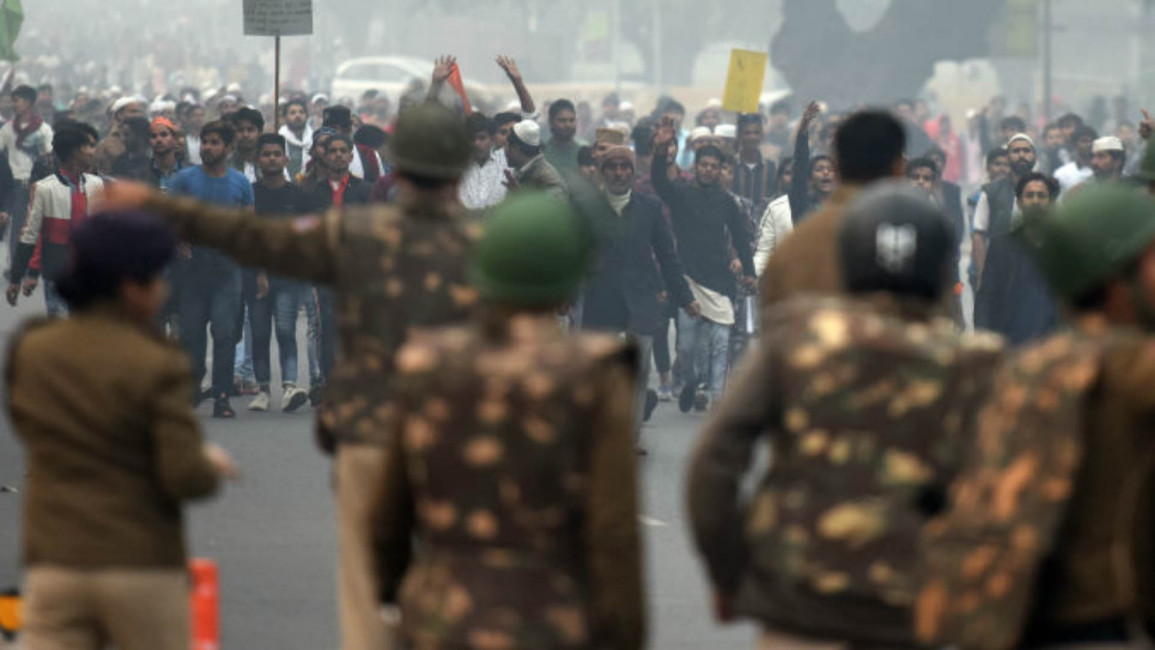India's Supreme Court fails to strike down 'anti-Muslim' citizenship law
India's Supreme Court fails to strike down 'anti-Muslim' citizenship law
The government will have four more weeks to respond to more than 100 petitions against a controversial citizenship law.
2 min read
Critics accused Modi's government of discrimination against Muslims [Hindustan Times]
India's Supreme Court on Wednesday rejected demands to suspend the implementation of a new citizenship law widely condemned as discriminatory against the country's 200 million-strong Muslim minority.
The court has given Prime Minister Narendra Modi's government another four weeks to respond to the more than 200 petitions brought against the controversial ammendment which came into effect on 10 January.
Heading a three-bench panel on Wednesday, Chief Justice Sharad Arvind Bobde said that only a full constitutional panel of five judges could rule on the matter.
"We will give you four weeks to file reply to all petitions," Bobde told the government's top lawyer, according to Reuters.
The new law opens a path towards citizenship for religious minorities from three neighbouring countries, but does not include Muslims.
Read more: Why Modi's plan against Muslims is coming unstuck
Critics of the law fear it will see thousands of Indian Muslims, who are unable to prove their status, stripped of their citizenship, detained or deported.
A controversial citizenship registry in the northeastern state of Assam that paved the way for the ammendment saw two million people, many of them Muslims, designated illegal migrants.
The Supreme Court has received 144 petitions challenging the constitutional validity of the law.
Since Modi's Hindu nationalist government first tabled the act last year, massive protests have swept across India calling for the law to be scrapped. For many, basing the right to citizenship on religion represents an affront to the country's secular constitution.
The government argues the law will protect Christians, Sikhs, Hindus and other religious minorities who face repression in nearby Muslim-majority countries.
At least 27 people have died in protests against the law and hundreds more have been injured in clashes with police, fuelling public anger.
The court has given Prime Minister Narendra Modi's government another four weeks to respond to the more than 200 petitions brought against the controversial ammendment which came into effect on 10 January.
Heading a three-bench panel on Wednesday, Chief Justice Sharad Arvind Bobde said that only a full constitutional panel of five judges could rule on the matter.
"We will give you four weeks to file reply to all petitions," Bobde told the government's top lawyer, according to Reuters.
The new law opens a path towards citizenship for religious minorities from three neighbouring countries, but does not include Muslims.
Read more: Why Modi's plan against Muslims is coming unstuck
Critics of the law fear it will see thousands of Indian Muslims, who are unable to prove their status, stripped of their citizenship, detained or deported.
A controversial citizenship registry in the northeastern state of Assam that paved the way for the ammendment saw two million people, many of them Muslims, designated illegal migrants.
The Supreme Court has received 144 petitions challenging the constitutional validity of the law.
Since Modi's Hindu nationalist government first tabled the act last year, massive protests have swept across India calling for the law to be scrapped. For many, basing the right to citizenship on religion represents an affront to the country's secular constitution.
The government argues the law will protect Christians, Sikhs, Hindus and other religious minorities who face repression in nearby Muslim-majority countries.
At least 27 people have died in protests against the law and hundreds more have been injured in clashes with police, fuelling public anger.
Nineteen of the deaths have been reported in the northern state of Uttar Pradesh, where police have been accused of using disproportionate force against protesters.
Follow us on Twitter and Instagram to stay connected



